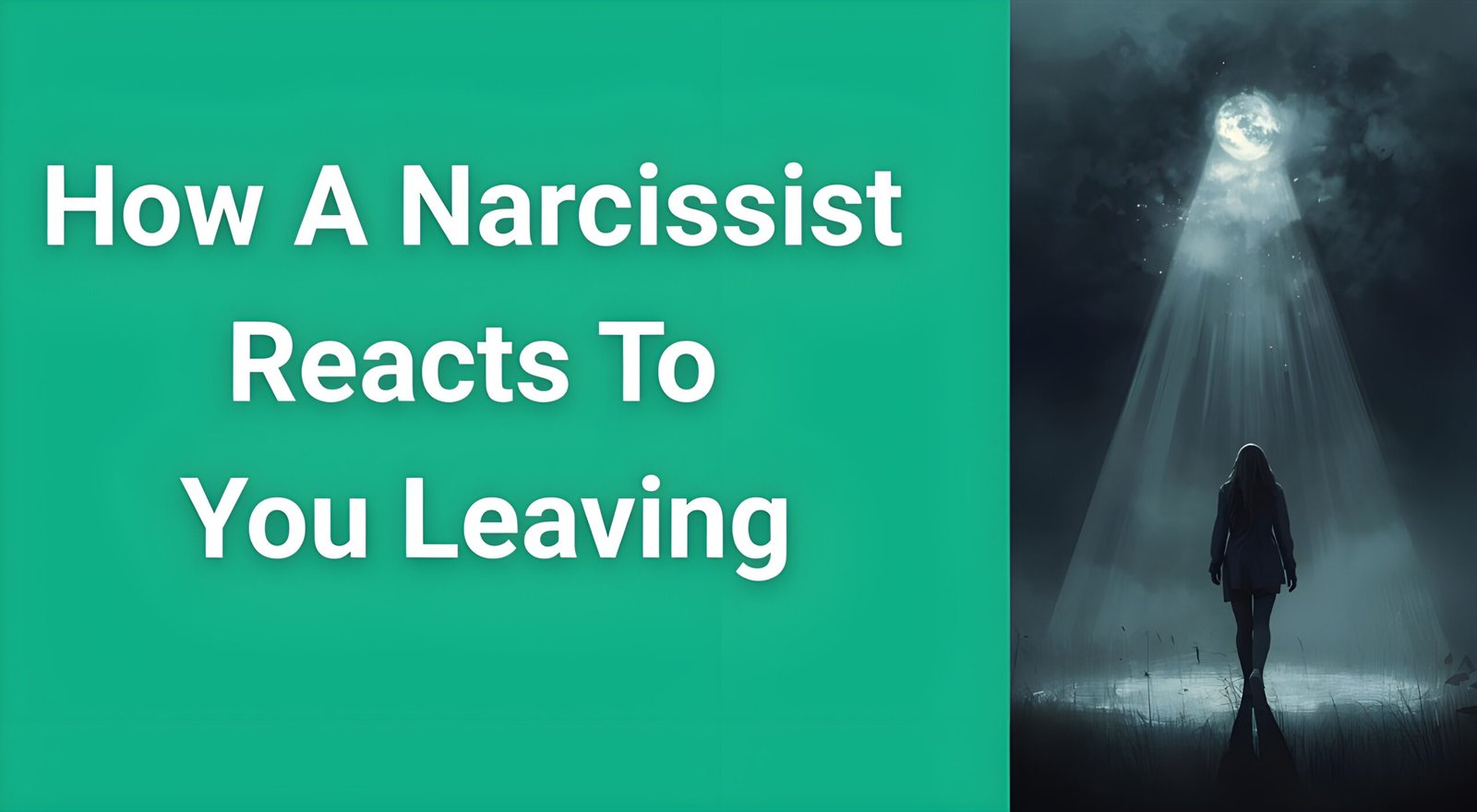You’ve made the decision. You’re leaving. But if you think your narcissistic partner will simply accept your choice and move on peacefully, you’re in for a shocking reality check.
- Why Narcissists Can’t Handle Being Left
- Phase 1: Shock and Disbelief (Days 1-3)
- Phase 2: Love Bombing and False Promises (Days 3-14)
- Phase 3: Guilt, Blame, and Victim Playing (Weeks 2-4)
- Phase 4: Rage and Retaliation (Weeks 3-8)
- Phase 5: Silent Treatment and Withdrawal (Weeks 6-12)
- Phase 6: Hoovering and Intermittent Contact (Months 2-6)
- Phase 7: Obsession and Long-term Harassment (Months 6+)
- Protecting Yourself: The Survival Strategies
- When You Can’t Leave Yet: Survival Mode
- The Science Behind Their Behavior
- Red Flags That Predict Dangerous Reactions
- Breaking Free: Your Path to Freedom
- The Recovery Journey Ahead
- Building Your Support Network
- Your New Beginning
- Frequently Asked Questions
Understanding how a narcissist reacts to you leaving isn’t just helpful—it’s essential for your safety and sanity. When you leave a narcissist, you’re not just ending a relationship; you’re challenging their entire sense of control and superiority. This triggers a psychological storm that can last months or even years.
After helping over 1,000 survivors navigate this treacherous journey, I’ve identified seven brutal phases that almost every narcissist goes through when someone leaves them. Recognizing these phases can mean the difference between successfully escaping and getting pulled back into the cycle of abuse.
Why Narcissists Can’t Handle Being Left
Before diving into the phases, you need to understand the psychology behind a narcissist’s extreme reaction to abandonment. To a narcissist, you’re not a separate human being with your own needs and desires—you’re an extension of their ego, a source of what psychologists call “narcissistic supply.”
When you attempt to leave, you’re essentially telling them that their control system failed. This creates what experts call a “narcissistic injury”—a deep wound to their carefully constructed false self. Their reaction isn’t about love or missing you; it’s about rage at losing their power over you.
Phase 1: Shock and Disbelief (Days 1-3)
The first way a narcissist reacts to you leaving is complete shock. Despite all the warning signs you’ve given them, narcissists genuinely cannot fathom why anyone would want to leave their “perfect” partnership.
During this phase, you might notice:
- Repeated texts asking “Are you serious?”
- Attempts to minimize your concerns
- Acting as if nothing happened
- Treating your leaving announcement as a temporary mood swing
What they’re thinking: “This isn’t real. They don’t really mean it. No one leaves me.”
Your response: Stay firm. Don’t explain, justify, or debate your decision. Any engagement feeds their hope that you’re not serious.
Phase 2: Love Bombing and False Promises (Days 3-14)
When the shock wears off, how a narcissist reacts when you leave shifts dramatically. Suddenly, you’re dealing with the person you fell in love with—or thought you did. This is calculated manipulation designed to pull you back in.
The love bombing toolkit includes:
- Constant apologies and promises to change
- Grand romantic gestures
- Sudden willingness to attend therapy
- Gifts, flowers, and love letters
- Intense declarations of love
Critical insight: This isn’t genuine remorse. Studies show that narcissists lack the emotional capacity for true empathy and change. They’re simply accessing behaviors that worked to control you before.
One survivor, Sarah, described it perfectly: “He became everything I’d begged him to be for three years—but only after I’d already packed my bags. It felt like proof he could change, but it was just another manipulation.”
Phase 3: Guilt, Blame, and Victim Playing (Weeks 2-4)
When love bombing fails, how a narcissist reacts to you leaving takes a darker turn. They’ll attempt to make you feel guilty for “abandoning” them during their “time of need.”
Common guilt tactics:
- “You’re destroying our family”
- “I’ll never survive without you”
- “You’re being selfish and cruel”
- Bringing up past sacrifices they made
- Threatening self-harm or suicide
The victim narrative: Simultaneously, they’ll begin telling everyone who will listen that you’re the problem. They’ll paint themselves as the devoted partner who was blindsided by your sudden, unreasonable behavior.
Protection strategy: Document everything. Screenshot messages. These records will be crucial if their behavior escalates to harassment or legal issues.
Phase 4: Rage and Retaliation (Weeks 3-8)
This is often the most dangerous phase. When a narcissist realizes you’re serious about leaving and their usual tactics aren’t working, their mask completely drops. How a narcissist reacts to you leaving during this phase can include:
Emotional retaliation:
- Vicious personal attacks
- Public humiliation campaigns
- Spreading lies and rumors
- Turning mutual friends against you
- Involving your children as weapons
Practical retaliation:
- Hiding or destroying shared assets
- Maxing out credit cards
- Interfering with your work
- Violating restraining orders
- Stalking behaviors
This phase requires maximum protection. If you haven’t already, now is the time to:
- Change your passwords and bank access
- Install security systems
- Notify your workplace about potential interference
- Consider legal protection if needed
For many people navigating this phase, professional guidance becomes essential. A Narcissistic Abuse Clarity Report can help you understand your specific situation and develop targeted safety strategies before the situation escalates further.
Phase 5: Silent Treatment and Withdrawal (Weeks 6-12)
After exhausting their energy on overt retaliation, how a narcissist reacts when you leave often shifts to cold silence. Don’t mistake this for acceptance or moving on—it’s a strategic withdrawal designed to:
- Make you worry about their wellbeing
- Punish you for leaving
- Create anxiety about what they’re planning
- Test if you’ll reach out to them
During this phase, they might:
- Completely ignore your attempts to co-parent
- Block you on all social media platforms
- Refuse to discuss practical matters like finances
- Act as if you don’t exist when you encounter them publicly
The psychological warfare: This silence is designed to make you feel invisible and irrelevant. Many survivors report feeling more distressed during the silent treatment than during active conflict.
Phase 6: Hoovering and Intermittent Contact (Months 2-6)
Named after the Hoover vacuum cleaner, this phase involves attempts to “suck you back in” through intermittent, seemingly innocent contact. How a narcissist reacts to you leaving during the hoovering phase is particularly insidious because it can happen months or even years later.
Hoovering tactics:
- “I was just thinking about you” messages
- Sending items you “forgot”
- Creating emergencies that require your attention
- Using holidays or birthdays as contact excuses
- Appearing places they know you’ll be
The trauma bond trap: If you’ve been in a long-term relationship with a narcissist, you’re likely dealing with trauma bonding—a psychological attachment that makes these contact attempts feel like relief rather than manipulation.
This is where many people get pulled back in. The intermittent reinforcement of their attention can feel addictive, especially when you’re still healing from the relationship’s end.
Breaking free from trauma bonds requires understanding the neurological addiction they create. The 30-Day Trauma Bond Recovery Workbook provides a science-based system that over 2,000 survivors have used to permanently break these psychological chains—even when willpower alone fails.
Phase 7: Obsession and Long-term Harassment (Months 6+)
The final and most persistent phase of how a narcissist reacts to you leaving is long-term obsession. Unlike healthy individuals who eventually accept rejection and move forward, narcissists can remain fixated on former partners indefinitely.
Signs of narcissistic obsession:
- Monitoring your social media through fake accounts
- Driving by your home or workplace
- Questioning mutual friends about your life
- Starting new relationships to make you jealous
- Sending gifts or letters years later
- Never stopping the “checking in” attempts
The dangerous reality: A narcissist who reaches this phase views you as “the one who got away.” You represent their greatest failure of control, which can make you a permanent target for their rage and manipulation attempts.
Why they never truly let go: In the narcissistic mind, no one has the right to reject them. Your successful escape is an ongoing wound to their ego that they can’t heal by finding new supply.
Protecting Yourself: The Survival Strategies
Now that you understand how a narcissist reacts when you leave, here are the essential strategies for protecting yourself through each phase:
Immediate Protection (Phases 1-3)
- Implement strict no-contact rules
- Block them on all platforms immediately
- Change your phone number if necessary
- Alert your support network about potential manipulation attempts
- Document every interaction for future protection
Medium-term Safety (Phases 4-5)
- Install home security systems
- Vary your routines and routes
- Inform your employer about potential workplace disruption
- Consider temporary relocation if harassment escalates
- Maintain detailed records of all threatening behavior
Long-term Freedom (Phases 6-7)
- Never respond to hoovering attempts
- Build strong personal boundaries
- Develop a trauma-informed support network
- Continue therapy to heal from the relationship’s impact
- Create a safety plan for unexpected encounters
When You Can’t Leave Yet: Survival Mode
Sometimes leaving isn’t immediately possible due to financial constraints, children, or other circumstances. If you’re in this situation, How to Survive When You Can’t Leave Yet becomes your roadmap for maintaining your sanity and safety while planning your eventual escape.
The guide provides specific strategies for:
- Maintaining emotional detachment while living together
- Protecting your children from manipulation
- Building financial independence secretly
- Creating safety plans for escalating situations
- Preserving evidence for future legal proceedings
The Science Behind Their Behavior
Understanding the psychology of how a narcissist reacts to you leaving helps reduce self-blame and confusion. Research shows that narcissistic personalities have fundamental differences in brain structure, particularly in areas responsible for empathy and emotional regulation.
When faced with abandonment, their brains literally cannot process the experience the same way a healthy person would. Instead of accepting responsibility or feeling genuine remorse, their minds default to blame, rage, and control attempts.
This isn’t an excuse for their behavior—it’s an explanation that can help you stop taking their reactions personally and focus on your own healing and protection.
Red Flags That Predict Dangerous Reactions
While all narcissists react poorly to being left, certain factors increase the likelihood of dangerous or extreme reactions:
High-risk indicators:
- History of physical violence
- Substance abuse problems
- Access to weapons
- Previous stalking behavior
- Threats of suicide or homicide
- Extreme possessiveness during the relationship
- Isolated you from friends and family
If your situation includes multiple red flags, prioritize safety over all other considerations. Contact domestic violence resources and consider professional threat assessment.
Breaking Free: Your Path to Freedom
Every day you delay leaving is another day of your life given to someone who doesn’t value it. But how a narcissist reacts when you leave shouldn’t terrify you into staying—it should prepare you to leave more safely and successfully.
Remember:
- Their extreme reactions prove you’re making the right choice
- The intensity will decrease over time if you maintain boundaries
- You deserve relationships built on respect, not control
- Thousands of people have successfully escaped similar situations
The Recovery Journey Ahead
Leaving is just the beginning of your healing journey. The trauma from narcissistic abuse runs deep, affecting your ability to trust your own perceptions, form healthy relationships, and maintain emotional stability.
Recovery typically involves:
- Processing the cognitive dissonance from abuse cycles
- Rebuilding your sense of self and identity
- Learning to recognize manipulation tactics
- Developing healthy relationship patterns
- Addressing trauma bonds and attachment issues
The path isn’t linear, and setbacks are normal. What matters is that you’ve chosen freedom over familiar toxicity.
Building Your Support Network
Narcissistic abuse is uniquely isolating because the manipulation is often invisible to outsiders. Many survivors struggle with friends and family who don’t understand why leaving was so difficult or why they’re still affected months later.
Building effective support requires:
- Connecting with others who’ve experienced narcissistic abuse
- Working with trauma-informed therapists
- Educating your loved ones about narcissistic manipulation
- Setting boundaries with people who minimize your experience
- Finding community through support groups or online forums
Your New Beginning
Understanding how a narcissist reacts to you leaving empowers you to prepare, protect yourself, and ultimately heal from one of the most confusing and devastating relationship experiences possible.
Their reaction to your leaving isn’t about love—it’s about loss of control. Their attempts to pull you back aren’t about missing you—they’re about maintaining their power source. Their ongoing obsession isn’t romantic—it’s pathological.
You are not responsible for managing their emotions, protecting their feelings, or making their life easier. Your only responsibility is to yourself: to heal, to grow, and to never again accept abuse as love.
The person reading this has already survived the worst part. You’ve lived through the gaslighting, manipulation, and cycles of hope and despair. Now you have the knowledge to navigate their predictable reactions and build the life you truly deserve.
Your freedom starts with understanding their patterns. Your healing begins when you choose yourself.
Frequently Asked Questions
Q: How long do narcissistic reactions to leaving typically last?
A: The intensity peaks in the first 3-6 months but can persist for years, especially during the hoovering and obsession phases. The key is maintaining strict boundaries regardless of how long it takes.
Q: Will a narcissist ever truly accept that you’ve left?
A: Acceptance requires emotional maturity and self-reflection that narcissists typically lack. Most continue viewing former partners as potential sources of supply indefinitely.
Q: What if they seem to have genuinely changed after I left?
A: Temporary behavioral changes are common manipulation tactics. True personality change requires years of intensive therapy that most narcissists refuse to pursue seriously.
Q: Is it normal to miss them despite the abuse?
A: Yes, trauma bonding creates genuine psychological attachment that feels like love but is actually addiction to the abuse cycle. Missing them doesn’t mean you should go back.
Q: How do I protect my children during their reaction phases?
A: Document everything, maintain consistent boundaries, avoid using children as messengers, and consider family therapy to help children understand the situation age-appropriately.
Q: Should I warn their new partner about their behavior?
A: Generally no, as this often backfires and provides ammunition for their smear campaign against you. Focus your energy on your own healing and protection.
Q: What if they threaten suicide when I try to leave?
A: Take all suicide threats seriously by contacting emergency services, but don’t let threats control your decisions. Manipulation through suicide threats is a common narcissistic tactic.
Q: Can restraining orders effectively stop narcissistic harassment?
A: Legal protection can be helpful but isn’t foolproof. Narcissists often find ways to circumvent legal boundaries, so combine legal protection with practical safety measures.






